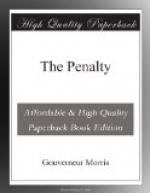Twice, sternly, she endeavored to go on with her work, and could not. Something of the May-weather message, that all is futile except life, had filtered into her blood. Her hands dropped to her sides, and her face, very rosy, became so wonderfully beautiful that Blizzard almost groaned aloud. Something told him that his morning was over, his morning filled with the happiness of propinquity and stolen looks, with the happiness that is half spiritual and half gloating.
“Thank you,” said Barbara, “ever so much. I sha’n’t do any more to-day. I’m not fit. But we have gotten on. Want to look?”
She turned the revolving-table so that Blizzard could look upon his likeness. And you may be sure that he did not lose the opportunity thus presented. He regarded the clay steadily, for a long time, without speaking. Then he drew one very long breath, and the expression upon his face softened.
“That man,” he said, “has had a hard life, Miss Ferris. It is all written in his face. When he was a little boy, he was the victim of a mistake so atrocious, so wicked, that the blood in his body turned to gall, and all his powers of loving turned to hatred. Instead of facing disaster like a man, he turned from it, and fled—down—down—down, and fell down—down—grappling with all that he could reach that was good or beautiful, and dragging it down with him—to destruction—to the pit—to hell on earth. And then he lived a long time, pampering all that was base in him, prospering materially, recognizing no moral law. He was contented with his choice—happy as a well-fed dog is happy in a warm corner. And then the inevitable happened. An idea came to him, a dream of peace and beauty, of well-doing and happiness. But that chance was torture, since, if he was to live it, he must undo the evil that he had done, unthink the thoughts that had been meat and drink to him, and he must get back to where he was before he fell.”
He paused, and extending his right forefinger pointed at the bust of himself and exclaimed:
“That man—there—that you’ve made in my image—line for line—torture for torture, must go on living in the hell which he has prepared with his own perverted mind. He can never get back. It is too late—too late—too late!”
His voice rose to a kind of restrained fury. The room shook with its strong vibrations.
Then he turned to Barbara, smiled, all of a sudden, gayly, almost genuinely, and said in a voice of humble gallantry:
“But I’ve done you a good turn. If you never proved it before, you’re proving these days that you are a heaven-born genius.”
A harder-headed girl than Barbara must have been pleased and beguiled. She blushed, and laughed. “I’ve only one thing to wish for,” she said.
“What is that?”
“I wish,” she said, “that you were the greatest art critic in the world.”
He leaned forward, and in a confidential whisper: “A secret,” said he, “between us two. I am.”




